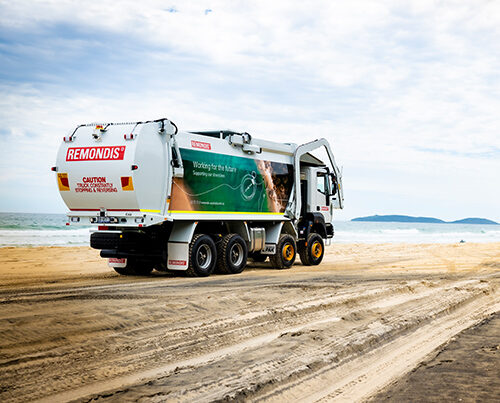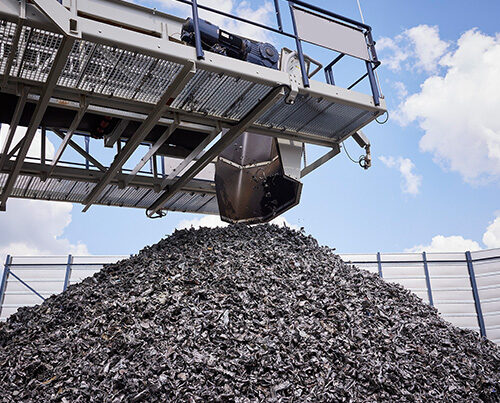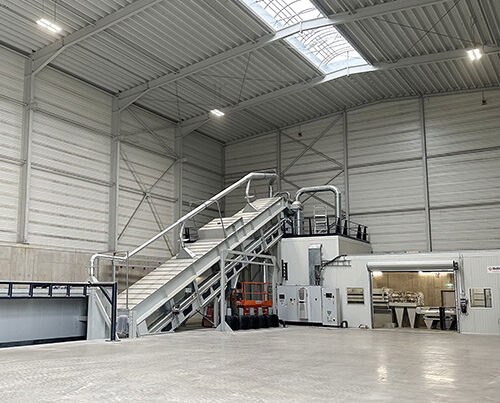Major rethink needed
Both the growing volume and diversity of plastic products and plastic waste and the impact they are having on our environment are forcing us to rethink this material and how it is handled. And not just by one group but across all levels. If the plastic life cycle is to be closed and this material (no matter what its form) is to be recovered so it can be reused again and again, then a concerted effort has to be made by all sections of society. REMONDIS has been focusing on thermoplastic recycling since the 60s – coming up with innovations and driving progress in this field. Recycling firms, however, cannot solve this problem by themselves. It will simply not be possible to bring about significant change unless politicians come up with smart, sustainable decisions, consumers play a more active role, raw material efficiency is taken into account by product designers and binding rules are introduced for public and industrial procurement. How then can plastic be turned into a sustainable material?
Plastic – an all-round material
Looking at plastics from an engineer’s point of view, there is no other material around that is so versatile. Plastics are transformed into moulded parts, fibres and film and processed into semi-finished products. They are used in packaging materials, textile fibres, lagging, pipes, flooring, varnish, glues and cosmetics; in electronics as a material for insulation, circuit boards and housing; in car manufacturing as a material for tyres, upholstery, dashboards, fuel tanks and for a whole host of other uses. Indeed, it is impossible to imagine today’s modern world, with its population of almost eight billion people, without it. It is everywhere: plastic packaging extending the shelf life of our foods, plastic-based medical technology, functional clothing, mobility. Economic, low-emission vehicles are only possible because of the lightweight components built into them – again, thanks to plastic. In other words: we cannot achieve any of this without plastics.
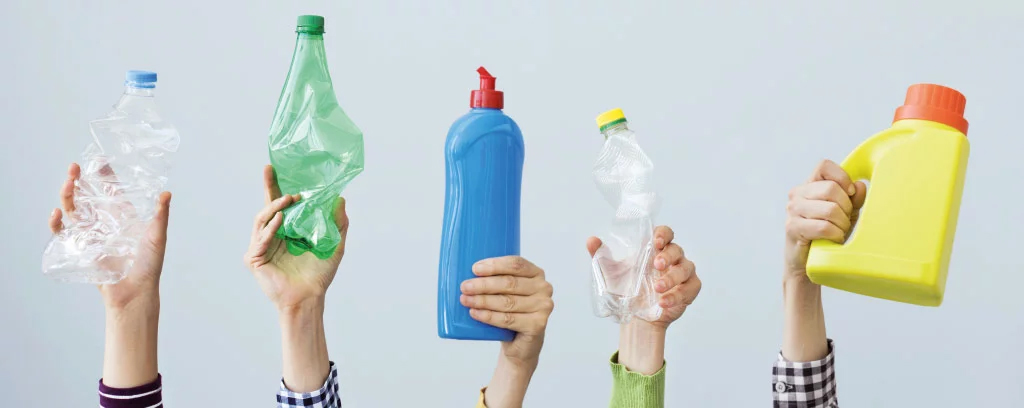
The challenge: to systematically recycle plastics
It should go without saying that plastic products should not end up littering our countryside and polluting our seas and oceans. Which takes us to our first challenge: ensuring that all plastics are systematically collected and recycled all around the globe so they can be reused. At the moment, the media is focusing its attention on the plastic waste in our oceans. Researchers at the Helmholtz Centre for Environmental Research in Leipzig have discovered that 90% of the plastic waste drifting in our seas comes from 10 rivers, eight of which are in Asia and two in Africa. A mere fraction has found its way from Germany and Europe. Blame is often apportioned – unfairly – to packaging material from Germany. In 2017, the ‘Dual System’ in Germany (the scheme responsible for the kerbside collection of old sales packaging) had almost all of the sales packaging it had collected from recycling bins processed either in Germany or in neighbouring European countries. According to the dual system operators, approx. 85% of the packaging collected was sent to German sorting and recycling plants and around 13% sent as a commodity to Germany’s East European neighbours to be processed.
Just a very small amount of the lightweight sales packaging was sold as an accredited commodity to Asia in line with Basel Convention rules – and always based on the premise that it will be recycled using environmentally sound processes. For the first time, the new Packaging Law has considerably increased the materials recycling rate, namely to 63%. It will be a huge challenge to achieve this. With this new rate in mind, REMONDIS opened up a new facility in Erftstadt near Cologne on 01 January 2019, which is one of the country’s biggest and most effective plants for screening materials collected by the ‘Dual System’. This facility can sort up to 120,000 tonnes and separate the different materials according to type. Time will tell whether modern sorting technology alone will enable these ambitious materials recycling rates to be met. They are, however, unlikely to be achieved unless manufacturers rethink the way their packaging is put together and households make a greater effort to sort their materials correctly.
PET recycling is almost there
Things are somewhat easier for pure recycled PET as this material – used primarily to make drinks bottles and functional clothing – is in high demand. According to a GVM study, 93% of all PET bottles were recycled in 2017. The recycling rate of bottles sold and collected via the deposit return scheme lies at 97.3%. Germany has, therefore, already achieved the EU’s target, i.e. that 90% of plastic bottles must be collected separately. Here, too, REMONDIS is spearheading the recycling efforts with its state-of-the- art facilities, such as its plant at the Port of Hamburg. REMONDIS Recycling produces around 20,000 tonnes of PET flakes at its facility in Hamburg alone, which can then be used to make new high quality products.
More money needs to be invested in research and development and in new facilities to make plastics fit for the future as a recyclable material. This also includes the efforts being made by the chemicals industry to drive forward chemical recycling (converting plastics into their original source materials) so it becomes a viable option. Time will tell whether such processes will be able to make a meaningful contribution or not. All too often, announcements have been made about chemical recycling systems that, in the end, are unable to be applied on an industrial scale. At the moment, these systems are not actually recognised as materials recycling. The Austrian chemicals industry is calling for the chemical recycling of plastics to be included in the calculation of the recycling rates. At present, chemical recycling is not recognised as a form of materials recycling in Austria – nor in Germany – and is not taken into account when calculating the recycling rate. Which brings us to the next important point: the role of politicians.
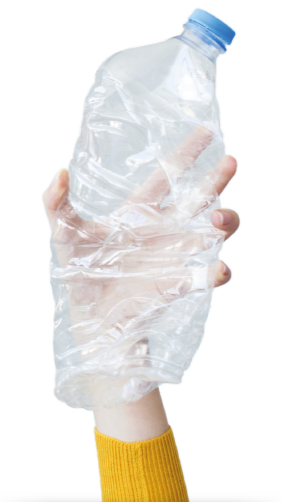
Use of recycled materials & green procurement
The whole business of recycling materials is only worth its while if there is actually a market for the recycled products. 14% of the raw materials needed by industrial businesses in Germany come from the recycling sector. Which means, of course, that 86% do not. There are two ways to increase this figure. Firstly, the market needs products that can be fully recycled. This goal can only be reached with an EU-wide Ecodesign Directive that takes raw material efficiency into account and gets manufacturers to design their products – no matter whether it be smartphones, sales packaging or cars and buildings – so that preferably all of the contents can be recycled when the product reaches the end of its useful life. Secondly, the best scenario would be for industrial businesses to automatically use recycled raw materials to cover their needs rather than go straight to the so-called primary raw materials that have such a negative impact on the environment. It is up to the politicians to decide what measures should be introduced to bring this about (e.g. introducing obligatory procurement rates). The recycling industry does, however, believe that this matter should at least be looked into.
The purchasing power of the public sector
This is not something that just affects the industry though. The public sector can also influence the move towards a greener economy. Councils invest around 300 billion euros a year – from buying pencils all the way through to buses. This puts local authorities in a strong position as they look to source their products. They could make a conscious decision here to use resource-efficient products to protect the environment. By doing so, they would promote eco-friendly products and services and help ensure new innovative, environmentally friendly products make it to market. The UBA [Federal Environment Agency] makes it clear just how important it believes green public procurement to be, writing on its website: “By making environmental protection one of the pillars of their procurement policies, government can lead the way. Setting such examples can potentially prompt both companies and consumers to opt for green alternatives.”
Raw material efficiency as a measurable criterion in product design: How much of my product is made of recycled raw materials? How many of its contents can be recovered and recycled at the end of its useful life?
The problem here is not a lack of good intention. Setting it into motion is proving to be more difficult. There are hardly any websites around that suggest that those responsible should prioritise the use of resource-efficient and environmentally friendly products. And this despite the fact that the German Cabinet passed the updated German Sustainability Strategy on 07 November 2018. This paper calls for public procurement to be more sustainable. So far, however, these plans have been limited to using recycled paper and reducing the carbon emissions of government cars. Which takes us to the last point: the efforts to tackle climate change.
“If new products had to contain a minimum amount of recycled raw materials, then this would automatically create a market for recycled materials.”
Herwart Wilms, REMONDIS Managing Director and Vice President of the BDE
Recycling – the best way to curb climate change
The logic is incredibly simple: each kilogram of recycled raw material recovered from waste dramatically reduces the consumption of land, energy and primary raw materials and cuts carbon emissions. According to DSD – Duales System Holding, the dual systems save around 3.1 million tonnes of CO2 equivalents every year, primarily through recycling plastics. At the 24th global climate conference held in the Polish town of Katowice, the BDE [Federal Association of the German Waste Management Industry] called for a systematic Europe-wide ban on landfills, for more sustainable procurement measures as well as for closer international collaboration work. If the European Union wishes to be carbon-neutral by 2050, then a ban on the use of landfills must be introduced across Europe as soon as possible. In addition, local, state and central government must lead the way in spearheading sustainable procurement. Local authorities and government offices should focus more on the Green Public Procurement criteria, extend the scope of the rules already in place and ensure they are enforced.
REMONDIS is showing how it’s done
Moreover, the BDE expressed a wish for the German government to create appropriate framework conditions to promote recycling. Herwart Wilms, REMONDIS managing director and Vice President of the BDE, underlined the need for a minimum content regulation: “If new products had to contain a minimum amount of recycled raw materials, then this would automatically create a market for recycled materials.” REMONDIS has been recycling products to deliver sustainable, climate friendly raw materials for decades now – recovering and returning around 30 million tonnes of recycled raw materials to production cycles every year.
Image credits: image 1: Adobe Stock: fovito; images 2, 3: Adobe Stock: sebra










